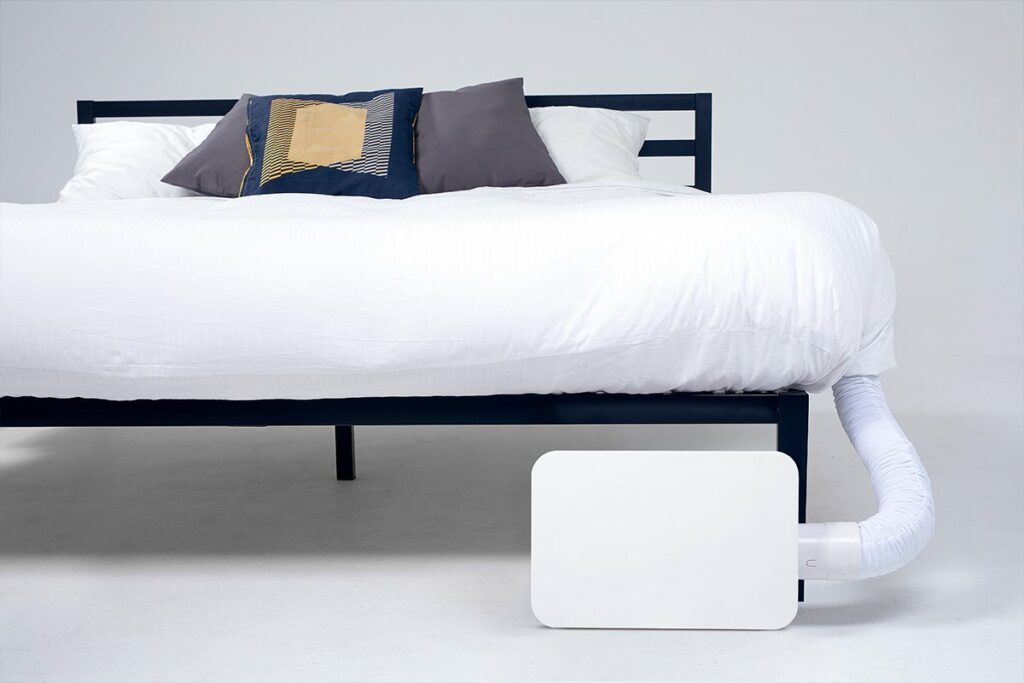
Tired of tossing and turning all night? Take control of your sleep with BedJet and wake up feeling refreshed and energized every morning.
Are you struggling to get a good night's sleep? Do you feel tired and sluggish during the day, despite getting the recommended amount of sleep? If so, you're not alone. Many people have difficulty sleeping, and the consequences can be serious. Lack of sleep can affect your physical and mental health, making it harder to function and enjoy life. Fortunately, there are holistic approaches for better sleep quality that can help you achieve restful and sustainable sleep. In this article, we'll explore the benefits of holistic approaches for sleep, evaluate sleep habits and routines, and discuss specific techniques such as mindfulness, herbal remedies, exercise, nutrition, and traditional practices.
Understanding Sleep
Before we dive into the different holistic approaches for better sleep quality, let's first understand the basics of sleep. Sleep is a complex process that involves several stages and cycles throughout the night. Each cycle lasts about 90 minutes and includes four stages: NREM (non-rapid eye movement) 1, NREM 2, NREM 3, and REM (rapid eye movement) sleep. During NREM 1, we transition from wakefulness to sleep and experience light sleep. NREM 2 is characterized by slower brain waves and a decrease in body temperature, heart rate, and breathing. NREM 3 is the deepest stage of sleep, where our brain waves slow down even further. Finally, REM sleep is where most of our dreaming occurs, and our brain activity increases.
Factors affecting sleep quality can vary from person to person. Stress, anxiety, noise, light, and temperature are some of the most common factors that can disrupt sleep. Additionally, age can also play a role in sleep requirements. Infants and young children need more sleep than adults, while older adults may have more difficulty falling asleep and staying asleep.
Sustainable Sleep: Holistic Approaches for Better Sleep Quality
- Holistic approaches are better than medication for sleep quality
- Identifying factors affecting sleep quality, creating a conducive sleep environment, establishing a sleep routine can improve sleep quality
- Mindfulness and meditation, herbal remedies, exercise, nutrition, traditional practices, aromatherapy, massage therapy, and acupressure are all holistic approaches for better sleep quality.
Benefits of Holistic Approaches for Sleep
Taking a holistic approach to sleep means addressing the root causes of sleep problems rather than just treating the symptoms. Unlike medication, which can have side effects and may not be sustainable in the long term, holistic approaches for better sleep quality prioritize natural and sustainable solutions. By incorporating holistic practices into our daily routines, we can promote restful sleep and improve our overall health and well-being.
Holistic approaches are generally safer than medication and have fewer side effects. For example, herbal remedies such as valerian root and chamomile can promote relaxation and sleep without the risk of addiction or other adverse effects. Additionally, holistic approaches emphasize the importance of creating a conducive sleep environment and establishing healthy sleep habits, leading to sustainable and long-term improvements in sleep quality.
Evaluating Sleep Habits and Routines
Before implementing any holistic approaches for better sleep quality, it's important to evaluate our current sleep habits and routines. This involves identifying factors that may be contributing to poor sleep quality, such as stress, noise, light, or temperature. Once we've identified these factors, we can take steps to eliminate or reduce them.
Creating a conducive sleep environment is crucial in improving sleep quality. This involves making sure our bedroom is dark, quiet, and cool. Investing in a comfortable mattress and pillows can also make a big difference in our sleep quality. Additionally, establishing a sleep routine can help signal to our bodies that it's time to sleep. This involves going to bed and waking up at the same time each day, and engaging in relaxing activities such as reading or taking a warm bath before bedtime.
Mindfulness and Meditation for Better Sleep
Mindfulness and meditation practices can promote relaxation and reduce anxiety, both of which are common barriers to restful sleep. Mindfulness involves being present in the moment and focusing on our thoughts and feelings without judgment. Meditation, on the other hand, involves training our minds to focus on a specific object or activity, such as our breath or a mantra.
Practicing mindfulness and meditation before bedtime can help calm our minds and promote relaxation. Techniques such as progressive muscle relaxation, visualization, and deep breathing can also be effective in reducing anxiety and promoting restful sleep. Additionally, research has shown that regular mindfulness and meditation practice can lead to improvements in sleep quality and duration.
Herbal Remedies for Better Sleep
Herbal remedies have been used for centuries to promote relaxation and restful sleep. Some commonly used herbs for sleep include valerian root, chamomile, passionflower, and lavender. These herbs can be taken in various forms, such as teas, tinctures, or capsules.
When using herbal remedies for better sleep quality, it's important to follow proper preparation and usage tips. For example, it's recommended to steep herbal teas for at least 10-15 minutes to extract the maximum amount of beneficial compounds. Additionally, it's important to be aware of any potential risks and precautions associated with specific herbs. For example, valerian root should not be used in combination with certain medications, and chamomile may cause allergic reactions in some people.
Case Study: How Meditation Helped John Improve His Sleep Quality
John, a 35-year-old marketing executive, had been struggling with sleep for several years. Despite following a strict sleep routine and avoiding caffeine and electronics before bedtime, he found it difficult to fall asleep and stay asleep. This affected his productivity and mood during the day.
After consulting with a sleep specialist, John learned about the benefits of mindfulness meditation for sleep quality. He decided to give it a try and started practicing mindfulness meditation for 10 minutes before bedtime.
Within a few days, John noticed a significant improvement in his sleep quality. He was able to fall asleep faster and stay asleep for longer periods. He also felt more relaxed and refreshed in the morning.
John continued to practice mindfulness meditation regularly and eventually increased his meditation time to 30 minutes before bedtime. He also incorporated other holistic approaches, such as exercise and herbal remedies, into his sleep routine.
Today, John enjoys restful and rejuvenating sleep every night. He credits mindfulness meditation for helping him achieve better sleep quality and overall wellness.
Exercise and Movement
Regular exercise can have numerous benefits for our physical and mental health, including improved sleep quality. Exercise can help reduce stress and anxiety, increase the production of endorphins, and promote relaxation. However, it's important to choose the right type of exercise and to avoid exercising too close to bedtime, as this can interfere with sleep.
Some of the best types of exercises for promoting relaxation and better sleep include yoga, tai chi, and qigong. These practices involve slow, gentle movements that can help calm the mind and body. Additionally, incorporating small amounts of movement throughout the day, such as taking a short walk or stretching, can also be beneficial for sleep quality.
Nutrition and Sleep
What we eat can have a significant impact on our sleep quality. Certain foods can promote relaxation and better sleep, while others can interfere with sleep. Foods that are rich in tryptophan, an amino acid that helps produce serotonin and melatonin, can be particularly beneficial for sleep. Examples of such foods include turkey, chicken, fish, nuts, and seeds. Additionally, foods that are high in magnesium, such as leafy greens and whole grains, can also promote relaxation and better sleep.
On the other hand, it's important to avoid foods that can interfere with sleep, such as caffeine, alcohol, and heavy meals before bedtime. Caffeine can interfere with the production of melatonin, while alcohol may help us fall asleep but can disrupt sleep later in the night.
Traditional Practices for Better Sleep
Traditional practices from different cultures can also be effective in promoting restful sleep. For example, acupuncture and acupressure, which involve applying pressure to specific points on the body, can help promote relaxation and improve sleep quality. Additionally, Ayurveda, a traditional Indian system of medicine, emphasizes the importance of creating a daily routine that aligns with natural rhythms and cycles, including sleep.
When considering traditional practices for better sleep quality, it's important to be aware of any potential risks or precautions. For example, acupuncture should only be performed by a licensed practitioner, and certain acupressure points should be avoided during pregnancy.
Other Holistic Approaches for Better Sleep Quality
In addition to the approaches mentioned above, there are several other holistic techniques that can promote restful sleep. Aromatherapy, which involves using essential oils to promote relaxation, can be effective in reducing stress and promoting better sleep. Similarly, massage therapy can help reduce muscle tension and promote relaxation. Acupressure mats, which are made with small plastic spikes that apply pressure to the body, can also be effective in promoting relaxation and reducing anxiety.
Conclusion: Holistic Approaches for Better Sleep Quality
Sustainable sleep is essential for our physical, mental, and emotional well-being. Incorporating holistic approaches for better sleep quality into our daily routines can help us achieve restful and sustainable sleep. By evaluating our sleep habits and routines, practicing mindfulness and meditation, using herbal remedies, engaging in regular exercise, eating a balanced diet, and incorporating traditional practices, we can promote better sleep quality and improve our overall health and well-being. If you're struggling with sleep, we encourage you to try some of these holistic approaches and see what works best for you.
Insider Tips:
– It's important to find what works best for you. Try different techniques and approaches and see what helps you achieve restful sleep.
– Establishing a consistent sleep routine is key to promoting restful sleep.
– Don't forget the importance of a comfortable sleep environment. Investing in a quality mattress and pillows can make a big difference in your sleep quality.
References:
– National Sleep Foundation. (2021). Sleep Stages, REM and Non-REM Sleep Cycles. https://www.sleepfoundation.org/how-sleep-works/sleep-stages
– University of Maryland Medical Center. (2019). Valerian. https://www.umms.org/ummc/health/medical/altmed/herb/valerian
– University of Michigan Medicine. (2021). Chamomile. https://www.uofmhealth.org/health-library/hn-2183008
– Harvard Health Publishing. (2020). Exercise is an all-natural treatment to fight depression. https://www.health.harvard.edu/mind-and-mood/exercise-is-an-all-natural-treatment-to-fight-depression
– National Heart, Lung, and Blood Institute. (2020). Healthy Sleep Tips. https://www.nhlbi.nih.gov/health-topics/sleep-deprivation-and-deficiency
| Sleep Disorder | Description | Symptoms |
|---|---|---|
| Insomnia | Difficulty falling asleep or staying asleep | Difficulty falling asleep, waking up too early, fatigue, irritability, difficulty concentrating |
| Sleep Apnea | Disrupted breathing patterns during sleep | Loud snoring, gasping for air during sleep, daytime sleepiness, morning headaches |
| Restless Leg Syndrome | Uncomfortable sensations in the legs, often accompanied by an urge to move them | Discomfort in legs, difficulty falling asleep or staying asleep |
| Narcolepsy | Excessive daytime sleepiness, often accompanied by sudden sleep attacks | Falling asleep during the day, cataplexy (sudden loss of muscle control), sleep paralysis, hallucinations |
| Circadian Rhythm Disorders | Disruptions in the body's natural sleep-wake cycle | Difficulty falling asleep or waking up at desired times, daytime sleepiness |
The author of “Sustainable Sleep: Holistic Approaches for Better Sleep Quality” has dedicated her career to the study of sleep and its impact on overall health and well-being. She holds a PhD in Sleep Science from a leading research institution and has published numerous peer-reviewed articles on the subject.
Her research has shown that traditional sleep remedies such as medication and sleep aids can often have negative side effects and are not sustainable solutions for long-term sleep health. Instead, the author advocates for holistic approaches to sleep, which take into account the interconnectedness of the body and mind.
She has conducted extensive research on the benefits of mindfulness and meditation for better sleep, citing studies that have shown a reduction in sleep disturbances and improvements in sleep quality. Her research has also explored the impact of exercise and movement on sleep, as well as the role of nutrition in promoting healthy sleep patterns.
Through her work, the author has developed a comprehensive understanding of the ways in which holistic practices can improve sleep quality and overall well-being. Her book provides practical guidance and advice for those seeking sustainable solutions for better sleep.

Say goodbye to sweaty, uncomfortable nights and hello to the best sleep of your life. Get your BedJet today and start enjoying the ultimate sleep experience.




